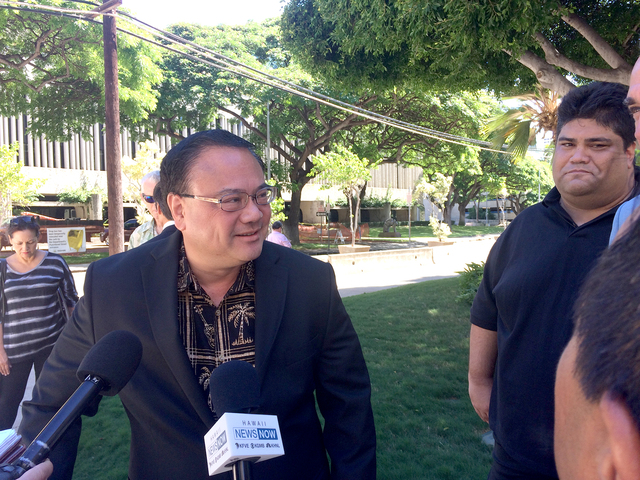HONOLULU — Opponents of an election designed to be a significant step toward Native Hawaiian self-governance are asking the U.S. Supreme Court to block votes from being counted in what they argue is an unconstitutional, racially exclusive process. ADVERTISING HONOLULU
HONOLULU — Opponents of an election designed to be a significant step toward Native Hawaiian self-governance are asking the U.S. Supreme Court to block votes from being counted in what they argue is an unconstitutional, racially exclusive process.
“This court’s intervention is urgently needed,” said the request filed Tuesday with Justice Anthony Kennedy, who can act on his own or get his colleagues involved.
Native Hawaiians are voting to elect delegates for a convention next year to come up with a self-governance document to be ratified by Native Hawaiians. Voting ends Monday.
A group of Native Hawaiians and non-Hawaiians is challenging the election, arguing Hawaii residents who don’t have Native Hawaiian ancestry are being excluded from the vote, in violation of their constitutional rights.
Kennedy requested a response from the lawsuit’s defendants due by 5 p.m. EST Wednesday. Defendants include the state and Nai Aupuni, the nonprofit organization guiding the election process.
Native Hawaiians are the last remaining indigenous group in the United States that hasn’t been allowed to establish its own government.
U.S. District Judge J. Michael Seabright in Honolulu ruled last month the purpose of the private election is to establish self-determination for the indigenous people of Hawaii. Those elected won’t be able to alter state or local laws, he said.
The challengers appealed and also filed an emergency motion to block the votes from being counted. Last week, the 9th U.S. Circuit Court of Appeals denied the emergency motion, prompting the challengers to appeal to the high court.
“Enormous political, social and economic consequences are at stake,” the application to the Supreme Court said. “The delegates chosen through this election will decide whether to adopt a new government that will affect every individual living in the state, as well as hundreds of thousands of individuals identified as Native Hawaiians.”
It’s urgent for the Supreme Court to intervene because there “will be no remedy if the votes in this election are counted and the results certified,” the application said. “This election cannot be undone.”
Racial exclusivity goes against Hawaiian values, said one of the Native Hawaiian plaintiffs, Kelii Akina, who is also president of public policy think-tank Grassroot Institute of Hawaii.
“The Hawaiian Kingdom consisted of citizens of multiples races including Native Hawaiians, Japanese, Chinese, Caucasians and others,” he said. “This racial inclusiveness is at the heart of the aloha spirit.”
Election supporters argue it’s crucial that the vote move forward because it presents a unique opportunity that has evaded Native Hawaiians for more than 100 years.
Clyde Namuo, executive director of the Native Hawaiian Roll Commission and a delegate candidate, has said self-determination is a way for Native Hawaiians to address longstanding concerns in the community in areas such as income, education and health.
“The western way of life has not necessarily been good to us,” he said last month. “We will be able to control our destiny in a better way if we form our government.”



